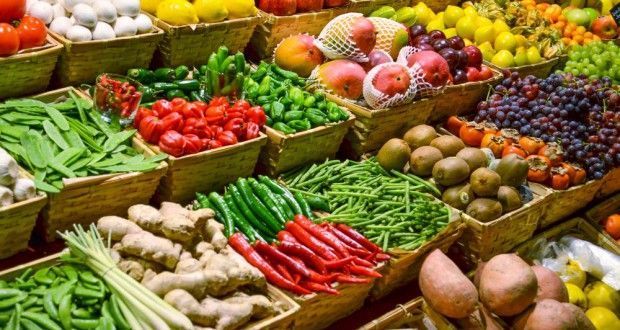ANALYSIS: The real reasons why Nigeria has a food security problem
Amid rising food prices, President Bola Tinubu last week declared an immediate “state of emergency” on food insecurity in the country.
The move is seen as part of an aggressive campaign to boost agricultural productivity and reduce the high prices of key food staples in Nigeria.
The development is in line with the government's short, medium and long-term strategies to address the challenges of food affordability and accessibility in the country.
"Mr. President is aware of the rising food prices and its impact on citizens. While availability is not an issue, affordability has been a major issue for many Nigerians in all regions of the country. This has resulted in a significant drop in demand, thus jeopardizing the viability of the entire agricultural and food value chain," said Dele Alake, Presidential Spokesperson, in the statement announcing the decision of the government.
In the statement, Mr. Alake listed some of the specific steps to be taken by the government in implementing the state of emergency. These include the immediate distribution of "fertilizer and grain to farmers and households" and the protection "of farms and farmers so that farmers can return to farmland without fear of attack".

In the recent past, there have been cases where constituted authorities (presidents or governors) have declared states of emergency due to civil unrest, armed conflict or epidemics in different regions/parts of the country.
When such declarations are made, the government authorizes the relevant agencies to quickly implement policies (curfew, lockdown, etc.) that it would not normally be authorized to implement to restore order for the security and protection of its citizens.
The recent declaration of a 'state of emergency' on food insecurity has confirmed experts' concerns about the continued decline in the purchasing power of Nigerians, amid low incomes and the effects of change on food prices.

It also lends credence to earlier predictions by the United Nations World Food Program (WFP) and the Food and Agriculture Organization of the United Nations (FAO) that more than 25 million Nigerians could be facing acute hunger at the height of the lean season (the period between planting and harvest – June-August) this year.
Meanwhile, according to the National Bureau of Statistics (NBS), Nigeria's annual inflation rate rose to 22.41% in May from 22.22% the previous month. The food inflation rate also followed a similar trend, dropping from 24.61% in April to 24.82% in May.
The situation has further worsened due to the consequences of government policies such as the immediate removal of gasoline subsidies leading to increased transport costs and the decision to unify exchange rates, among others.< /p>
Since Mr. Tinubu made his statement, many Nigerians have raised concerns about the main clues behind food insecurity in Nigeria and the legal implications of Mr. Tinubu's statement. a state of emergency on food security in the country.
Food safetyAccording to the Food and Agriculture Organization of the United Nations (FAO), food security is achieved when all people have, at all times, physical and economic access to sufficient, safe and nutritious food that meets their dietary needs and food preferences for an active and healthy life.
It is also explained as the state in which individuals have enough food to generate a calorie requirement of approximately 2,200-2,300 calories per day for adult females and 2,900-3,000 (approximately 8-8 10 kg of corn flour) calories per day for adult men, while children need a lower level of calories to...

Amid rising food prices, President Bola Tinubu last week declared an immediate “state of emergency” on food insecurity in the country.
The move is seen as part of an aggressive campaign to boost agricultural productivity and reduce the high prices of key food staples in Nigeria.
The development is in line with the government's short, medium and long-term strategies to address the challenges of food affordability and accessibility in the country.
"Mr. President is aware of the rising food prices and its impact on citizens. While availability is not an issue, affordability has been a major issue for many Nigerians in all regions of the country. This has resulted in a significant drop in demand, thus jeopardizing the viability of the entire agricultural and food value chain," said Dele Alake, Presidential Spokesperson, in the statement announcing the decision of the government.
In the statement, Mr. Alake listed some of the specific steps to be taken by the government in implementing the state of emergency. These include the immediate distribution of "fertilizer and grain to farmers and households" and the protection "of farms and farmers so that farmers can return to farmland without fear of attack".

In the recent past, there have been cases where constituted authorities (presidents or governors) have declared states of emergency due to civil unrest, armed conflict or epidemics in different regions/parts of the country.
When such declarations are made, the government authorizes the relevant agencies to quickly implement policies (curfew, lockdown, etc.) that it would not normally be authorized to implement to restore order for the security and protection of its citizens.
The recent declaration of a 'state of emergency' on food insecurity has confirmed experts' concerns about the continued decline in the purchasing power of Nigerians, amid low incomes and the effects of change on food prices.

It also lends credence to earlier predictions by the United Nations World Food Program (WFP) and the Food and Agriculture Organization of the United Nations (FAO) that more than 25 million Nigerians could be facing acute hunger at the height of the lean season (the period between planting and harvest – June-August) this year.
Meanwhile, according to the National Bureau of Statistics (NBS), Nigeria's annual inflation rate rose to 22.41% in May from 22.22% the previous month. The food inflation rate also followed a similar trend, dropping from 24.61% in April to 24.82% in May.
The situation has further worsened due to the consequences of government policies such as the immediate removal of gasoline subsidies leading to increased transport costs and the decision to unify exchange rates, among others.< /p>
Since Mr. Tinubu made his statement, many Nigerians have raised concerns about the main clues behind food insecurity in Nigeria and the legal implications of Mr. Tinubu's statement. a state of emergency on food security in the country.
Food safetyAccording to the Food and Agriculture Organization of the United Nations (FAO), food security is achieved when all people have, at all times, physical and economic access to sufficient, safe and nutritious food that meets their dietary needs and food preferences for an active and healthy life.
It is also explained as the state in which individuals have enough food to generate a calorie requirement of approximately 2,200-2,300 calories per day for adult females and 2,900-3,000 (approximately 8-8 10 kg of corn flour) calories per day for adult men, while children need a lower level of calories to...
What's Your Reaction?






















